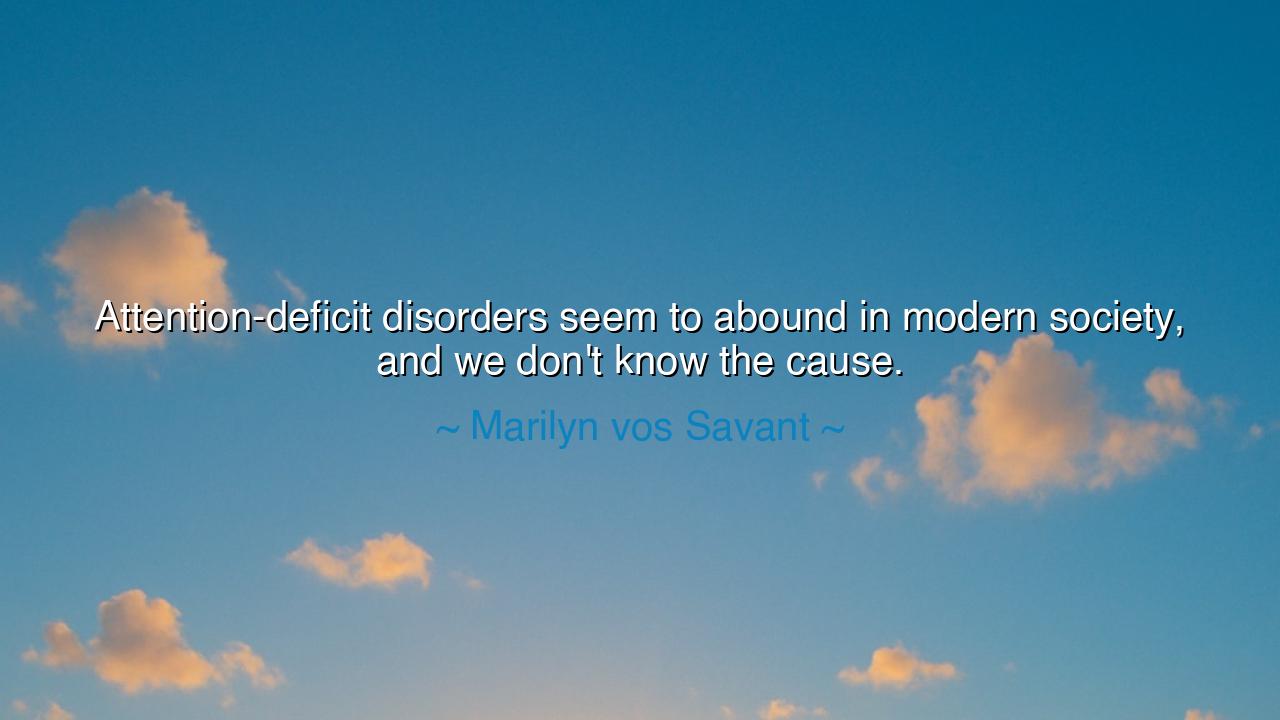
Attention-deficit disorders seem to abound in modern society, and
Attention-deficit disorders seem to abound in modern society, and we don't know the cause.






Listen well, O children, for I bring you words that carry the weight of our modern struggles, words that reflect the confusion and the challenges of our time. Marilyn vos Savant, a woman of great insight, once said, "Attention-deficit disorders seem to abound in modern society, and we don't know the cause." These words resonate deeply in the hearts of those who live in a world where distractions are endless, where the mind is constantly pulled in a thousand different directions, and where focus seems to be slipping from our grasp. Her words are not merely an observation of a condition, but a profound question about the nature of our society itself—a society that has become, in many ways, the cause of the very disorder it struggles to understand.
What, O children, does it mean when we speak of attention-deficit disorders? It is to acknowledge that in this age of constant noise, of ever-present technology, of distractions that seem to multiply by the minute, the human mind struggles to stay focused, to maintain its clarity, its direction. We are bombarded by stimuli, our senses overwhelmed by the information that surrounds us. We no longer have the time or the mental space to sit in silence, to reflect, or to listen deeply. Instead, we race from task to task, never fully present in the moment. This disorder is not just a medical condition; it is a reflection of a society that has lost its way, a society that demands speed and efficiency at the cost of depth and clarity.
Look, O children, to the ancient philosophers, who knew that to live a full and meaningful life required the cultivation of focus and introspection. Socrates, the great Greek philosopher, spent his days in deep dialogue, not distracted by the world around him, but dedicated to the pursuit of truth. He understood that in order to understand the world, one must first understand oneself, and that understanding requires the full attention of the mind. The ancient philosophers did not live in a world of endless distractions, and so they were able to cultivate deep wisdom, to shape ideas that have lasted for millennia. Their ability to focus, to dedicate themselves fully to a single task or thought, was the foundation upon which their teachings were built.
In our modern world, O children, the problem of attention-deficit disorders is not just one of individuals, but of a society that has created a world where distraction is the norm. We live in an age where technology constantly calls for our attention, where the next notification, the next piece of information, is always just a click away. We are constantly moving, constantly consuming, and in doing so, we lose touch with what truly matters. It is no wonder, then, that so many struggle with focus, for we are not taught how to center ourselves in a world that pulls us in every direction. We are distracted, not by illness alone, but by the very fabric of the society we have built.
Consider, O children, the story of the printing press, which revolutionized the world by allowing information to spread faster than ever before. When Johannes Gutenberg first invented the press, it opened the floodgates of knowledge, making books and ideas accessible to many more people. But as society adapted to this newfound ability to spread ideas, it also led to a flood of information, some of which was truth and some of which was misinformation. Just as we now face an overwhelming tide of information in our digital age, so too did humanity face the challenge of distraction when it first encountered the written word. The printing press was both a gift and a curse, much as modern technology is today. It gave us the power to know, but it also demanded our constant attention, forcing us to navigate a sea of information without the means to stay grounded.
So, O children, what lesson can we learn from this? Attention-deficit disorders are not merely the result of individual weakness or lack of discipline; they are the symptom of a society that has lost its balance. A society that values speed, production, and consumption above reflection, introspection, and focus. The lesson is not that we must blame ourselves or others for the rise of these disorders, but that we must acknowledge the environment that cultivates them. If we are to reclaim our ability to focus, to listen, and to reflect, we must first reclaim our time. We must learn to slow down, to silence the noise, and to find the space for deep concentration and peace.
Therefore, O children, I charge you to step away from the distractions of the world. Do not allow the endless demands of modern society to steal your attention from what truly matters. Practice focus, and learn the art of being fully present in each moment. Take the time to cultivate your mind, to spend time in thought and reflection, to find the quiet that allows you to hear the voice of your own wisdom. In doing so, you will find that the world’s distractions lose their hold over you, and you will become masters of your own attention, able to discern what is truly important in a world that often leads us astray. The true miracle lies not in surviving the flood of distractions, but in finding the clarity and focus to thrive within it.






AAdministratorAdministrator
Welcome, honored guests. Please leave a comment, we will respond soon